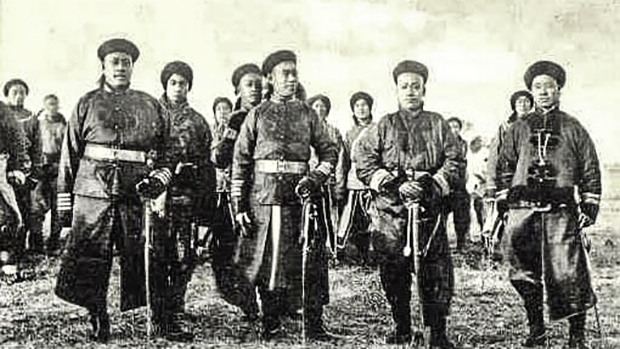Once upon a time in a land far away, a 4-year-old boy became an emperor. At first his aunt helped him rule, but when he turned 18, he took over, and he wanted to change many things. Imitating other countries, he founded a university. He streamlined the government payroll to eliminate cushy jobs. He hoped for a parliament, and he even issued a decree to protect Christian citizens.
But the emperor did not live happily ever after. His aunt and her cronies did not want so much change. They engineered a coup d’état and returned to power.
Now there came a tremendous drought, and the people became hungry. His aunt blamed the foreigners who had helped the young emperor. The ancient gods were withholding rain, she said, until all foreigners and all who followed foreign religions were banished.
A group of peasants trained in kung fu also blamed foreigners for their troubles. These peasants implored the gods to possess them and make them invulnerable to the foreigners’ bullets. The emperor’s aunt decreed that if they attacked and killed foreigners, she would look the other way. And so they destroyed the foreign-built railways and telegraph lines and murdered whatever foreigners and Christians they could.
The countries from which the foreigners had come were angry. They sent their armies to restore order. They demanded compensation for lost property and people. The emperor’s aunt had to run away and hide. Xenophobia—fear and hatred of foreigners—turned out to be a poor political strategy.
At the end of the 19th century, eight nations had significant numbers of businesspeople and diplomats in China. Their modern railroads and telegraph lines had greatly increased the vast country’s internal communication. Their missionaries, educators, and health workers had served the Chinese people for centuries. Many Chinese had become Christians.
The Boxer Uprising (1899–1901) was an attempt to purge the country of foreign influence. Boxers, or members of the Society of Righteous Fists, laid siege for 55 days to the foreign quarter in Beijing. One provincial governor massacred 44 Protestant missionaries—men, women, and children—after luring them to his capital with promises of safety. The final death toll: 136 Protestant missionaries and 53 children; 2,000 Chinese Protestants; well over 200 Russian Orthodox Christians; and 30,000 Chinese Catholics.
Drastic repercussions followed. Some 20,000 soldiers invaded China and quashed the rebellion. Many foreigners—mainly soldiers and businesspeople, but also some missionaries—engaged in looting. Governments, companies, and mission agencies that lost people and property demanded huge reparations. Their demands put an already shaky dynasty into a worse condition and created further resentments.
Hudson Taylor, founder of the China Inland Mission (CIM), stood apart. CIM lost more people than any other agency: 58 adults and 21 children. Even still, Taylor refused any payment for the group’s losses in order to show the “meekness and gentleness of Christ.” This impressed the Chinese. But American newspaper writers focused on greedier Western foreigners. In the popular imagination, Christian missions and Western imperialism became firmly linked.
Retribution was bad religion then, and it’s bad religion now.
Fifty years later, Chinese Christian leaders were still living with the fallout of the Boxer Rebellion and intervening waves of Chinese nationalism. After the Communist revolution, many cut ties to Western churches, pledging that Chinese churches would be anti-imperialist, antifeudal, and anticapitalist. Unfortunately, those promises played into the xenophobia of their political masters.
Nowadays, China’s leaders are determined to be part of the world economy, and the officially recognized Chinese church no longer bows to xenophobia. The heirs of those midcentury Chinese church leaders appreciate the missionaries’ contributions. They recognize that the church’s strength largely rests on the dedication of those who gave their lives in 1900 and the many others who served after them—including Christianity Today cofounder L. Nelson Bell.
Hatred of foreigners is, however, resurgent around the globe. Xenophobia was bad politics in 19th-century China, and it is bad politics now. Retribution was bad religion then, and it’s bad religion now. How would China’s history have changed if all Christian missionaries had responded as graciously as Hudson Taylor?
David Neff is the former editor in chief of Christianity Today.










